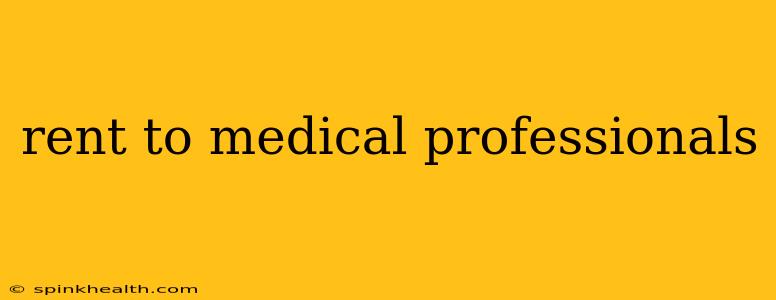The medical profession is booming, and with it comes a growing demand for housing tailored to their specific needs. Landlords who cater to this niche market can experience significant advantages, from higher rental yields to stable, long-term tenants. But understanding this demographic and their requirements is key to unlocking success. This guide will delve into the specifics of renting to medical professionals, addressing common questions and offering valuable insights.
What are the benefits of renting to medical professionals?
Medical professionals, encompassing doctors, nurses, surgeons, dentists, and other healthcare workers, often represent a desirable tenant profile. They typically boast stable incomes, strong credit scores, and a commitment to maintaining their property. This translates to fewer late rent payments, less property damage, and a more predictable rental income stream for landlords. Imagine a reliable tenant who consistently pays rent on time and respects the property – that's the potential reward of attracting medical professionals. Furthermore, their career stability often leads to longer-term tenancy, minimizing vacancy periods and reducing the costs associated with finding and screening new tenants.
What are the challenges of renting to medical professionals?
While the advantages are plentiful, there are specific challenges to consider. Medical professionals, particularly those in residency or fellowship programs, might have shorter-term lease needs. Additionally, their demanding work schedules might require flexible lease terms or accommodating communication strategies. Finding properties that meet their specific needs – proximity to hospitals, secure parking, and perhaps even furnished accommodations – can also pose a challenge. The competition for this desirable tenant pool can be fierce, necessitating a competitive rental strategy.
What type of property is most attractive to medical professionals?
This is often influenced by their specific needs. Proximity to their place of work is paramount, especially for those working long hours or facing emergency calls. Safety and security are also key concerns. Properties in well-maintained complexes, equipped with security systems and ample parking, are highly desirable. Features like in-unit laundry, high-speed internet, and modern appliances are considered significant pluses. Furthermore, depending on the medical professional's family size, apartment sizes and layouts will need to align with their family requirements. Consider offering furnished apartments or short-term lease options, especially for those starting their careers in a new city or region.
How can I attract medical professionals as tenants?
Marketing your property effectively is crucial. Highlight features appealing to medical professionals in your listing descriptions. Emphasize proximity to hospitals, safety features, and convenient amenities. Using targeted advertising on platforms frequented by medical professionals is also beneficial. Additionally, consider working with local hospitals or medical centers to establish relationships and promote your properties to their staff.
What are the legal considerations when renting to medical professionals?
Familiarize yourself with all relevant local, state, and federal fair housing laws. Discrimination based on profession is illegal, so ensure your marketing and screening process are compliant. It's crucial to have a well-defined lease agreement covering all terms and conditions to protect both the landlord and the tenant. Consult with a legal professional to ensure your rental practices align with all legal requirements.
How can I screen medical professionals for tenancy?
While medical professionals are generally reliable tenants, a thorough screening process is always necessary. Check credit reports, background checks, and verify income stability through pay stubs or employment verification. A well-structured application process and clear communication throughout the process can significantly benefit both the landlord and the prospective tenant.
This guide serves as a starting point for landlords seeking to tap into the thriving market of renting to medical professionals. Remember that understanding their specific needs, offering appealing properties, and maintaining a professional and compliant approach are critical components of success. By addressing these factors proactively, landlords can build strong relationships with reliable tenants and achieve long-term success in this rewarding niche market.

